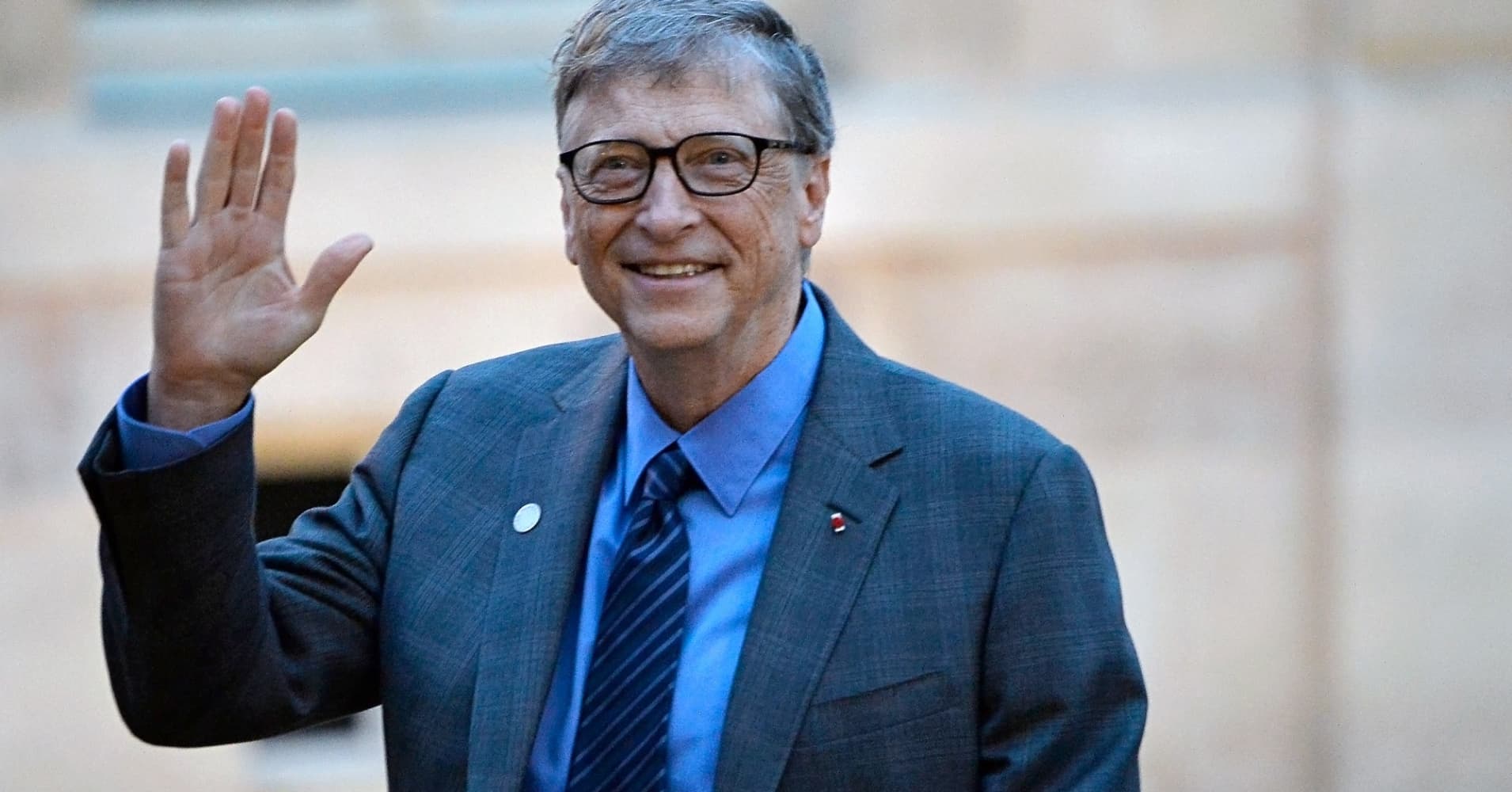
Personalized cancer vaccines. Lab-grown meat. Toilets that save lives. Wearable electrocardiograms.
Microsoft co-founder and billionaire Bill Gates says these are among the technologies that are going to change the world we live in.
Gates curated the 18th edition of the MIT Technology Review’s annual roundup of “recent technology breakthroughs that are poised to deeply impact our lives” released Wednesday, according to an MIT press release.
For much of human history, innovation has been focused on improving survival rates and longevity, Gates writes in an introduction to the list. But “because we’re living longer, our focus is starting to shift toward well-being,” Gates writes. “We’ve reached a point where we’re tackling both ideas at once, and that’s what makes this moment in history so interesting.”
Here are some of the coolest technologies Gates included on the 2019 MIT breakthrough technologies list.
Cancer vaccines that can be customized
Companies including BioNTech and Genentech are working to bring to market personalized cancer vaccines that direct the body’s own immune system to destroy cancerous cells by identifying mutations that are specific to each tumor.
Personalized cancer vaccines. Lab-grown meat. Toilets that save lives. Wearable electrocardiograms.
Microsoft co-founder and billionaire Bill Gates says these are among the technologies that are going to change the world we live in.
Gates curated the 18th edition of the MIT Technology Review’s annual roundup of “recent technology breakthroughs that are poised to deeply impact our lives” released Wednesday, according to an MIT press release.
For much of human history, innovation has been focused on improving survival rates and longevity, Gates writes in an introduction to the list. But “because we’re living longer, our focus is starting to shift toward well-being,” Gates writes. “We’ve reached a point where we’re tackling both ideas at once, and that’s what makes this moment in history so interesting.”
Here are some of the coolest technologies Gates included on the 2019 MIT breakthrough technologies list.
Cancer vaccines that can be customized
Companies including BioNTech and Genentech are working to bring to market personalized cancer vaccines that direct the body’s own immune system to destroy cancerous cells by identifying mutations that are specific to each tumor.
“Scientists are on the cusp of commercializing the first personalized cancer vaccine,” says the MIT Technology Review. If all goes well, the technology “could effectively shut down many types of cancers.”
Of course, there are hurdles to developing these vaccines as scale, as each one requires a tumor biopsy and DNA sequencing before the vaccine can be made.
Robots that can do your dishes, take care of grandma
The robot revolution is upon us. For tech leader Elon Musk, “the scariest problem” is “robots will be able to do everything better than us,” he said in 2017.
That may be true, but right now robots are “clumsy and inflexible,” the MIT Technology Review says. However, the development of technology that allows robots to learn dexterity moves through trial and error is changing that. For example, in San Francisco-based OpenAI’s project Dactyl, a robot hand teaches itself to flip a toy block in its fingers with sophisticated neural-network software, according to MIT Technology Review.
Personalized cancer vaccines. Lab-grown meat. Toilets that save lives. Wearable electrocardiograms.
Microsoft co-founder and billionaire Bill Gates says these are among the technologies that are going to change the world we live in.
Gates curated the 18th edition of the MIT Technology Review’s annual roundup of “recent technology breakthroughs that are poised to deeply impact our lives” released Wednesday, according to an MIT press release.
For much of human history, innovation has been focused on improving survival rates and longevity, Gates writes in an introduction to the list. But “because we’re living longer, our focus is starting to shift toward well-being,” Gates writes. “We’ve reached a point where we’re tackling both ideas at once, and that’s what makes this moment in history so interesting.”
Here are some of the coolest technologies Gates included on the 2019 MIT breakthrough technologies list.
Cancer vaccines that can be customized
Companies including BioNTech and Genentech are working to bring to market personalized cancer vaccines that direct the body’s own immune system to destroy cancerous cells by identifying mutations that are specific to each tumor.
“Scientists are on the cusp of commercializing the first personalized cancer vaccine,” says the MIT Technology Review. If all goes well, the technology “could effectively shut down many types of cancers.”
Of course, there are hurdles to developing these vaccines as scale, as each one requires a tumor biopsy and DNA sequencing before the vaccine can be made.
Robots that can do your dishes, take care of grandma
The robot revolution is upon us. For tech leader Elon Musk, “the scariest problem” is “robots will be able to do everything better than us,” he said in 2017.
That may be true, but right now robots are “clumsy and inflexible,” the MIT Technology Review says. However, the development of technology that allows robots to learn dexterity moves through trial and error is changing that. For example, in San Francisco-based OpenAI’s project Dactyl, a robot hand teaches itself to flip a toy block in its fingers with sophisticated neural-network software, according to MIT Technology Review.
“We’ll need further breakthroughs for robots to master the advanced dexterity needed in a real warehouse or factory. But if researchers can reliably employ this kind of learning, robots might eventually assemble our gadgets, load our dishwashers, and even help Grandma out of bed,” the MIT Technology Review says.
Technology that takes carbon dioxide out of the air
“Pulling CO2 out of the air is, from an engineering perspective, one of the most difficult and expensive ways of dealing with climate change. But given how slowly we’re reducing emissions, there are no good options left,” the MIT Technology Review says.
Innovative companies are working to catch the carbon dioxide and repurpose it. For example, Canadian start-up Carbon Engineering (in which Gates is an investor) aims to produce synthetic fuels with the captured carbon, and Climeworks, based in Zurich, will produce methane from carbon emissions and also sell carbon dioxide to the soft-drink industry, among others.
But “the ultimate goal is to lock greenhouse gases away forever,” the MIT Technology Review said.
No-kill, sustainable meat and burgers
Industry leaders Beyond Meat and Impossible Foods are popularizing the juicy and meaty-tasting plant-based burger. Other companies, like Memphis Meats, are working to develop meat grown in the lab from animal cells, so there’s no animal slaughter involved. (Gates is a investor in all three companies.)
These versions of meat are better for the environment. “[P]roducing a pound of meat protein with Western industrialized methods requires 4 to 25 times more water, 6 to 17 times more land, and 6 to 20 times more fossil fuels than producing a pound of plant protein,” the MIT Technology Review says, and 3 percent of U.S. greenhouse gas emissions come from methane emitted from cows.
Wearable electrocardiograms
Every year, about 790,000 Americans have a heart attack, according to the CDC. One tool that can help detect a condition that could lead to a stroke or a heart attack is an electrocardiogram — often called either an EKG or ECG — which records the electric signals in your heart.
Now, new regulatory approvals and improved hardware and software are making possible ECG-enabled smart watches that approach medical-grade level. For example, a band made by AliveCor attaches to the Apple Watch is able to detect atrial fibrillation, an irregular and sometimes rapid heart rate that increases your risk of stroke and heart failure.
Self-contained toilets
Without modern plumbing, waste disposal spreads bacteria, viruses and parasites that cause diarrhea — which results in one in nine deaths of children around the world — as well as cholera, according to MIT Technology Review
“Building sewers, using clean water, having a processing plant—that’s the paradigm in rich countries. In low-income countries, the capital cost of a sewer system is just unattainable,” Gates told MIT.
Now, cheap, self-contained toilets that do not need a sewer system because they can treat and dispose of waste themselves are in the works. “This toilet takes the human waste, liquid and solid, and in most cases does some type of separation. The solids you can essentially burn. The liquids you can filter,” Gates says.
“The Gates Foundation has given out $200 million in grants to try to get this technology going. It’s not there yet.”
The rest of the list
Rounding out the MIT list are: the development of new nuclear energy reactor designs that will make nuclear power “safer and cheaper”; a blood test that can predict if a baby is likely to be born prematurely and thereby increase chance of survival; a pill-sized probe that can be swallowed to take detailed pictures of the gut without anesthesia; and souped-up artificial intelligence assistants with which you can have a conversation and that can “deal with daily minutiae like taking meeting notes, finding information, or shopping online.”
[“source=cnbc”]




